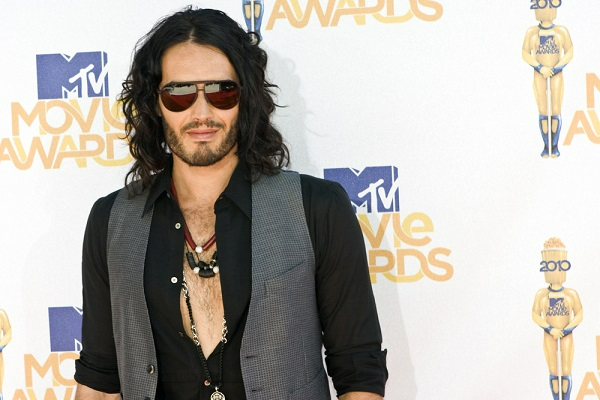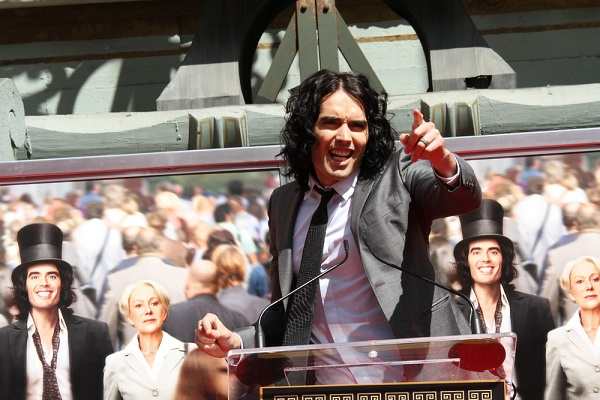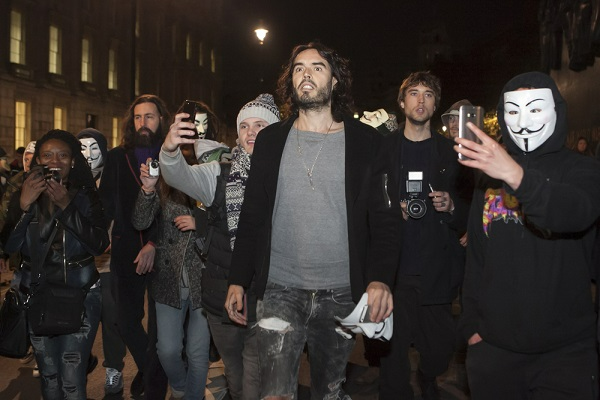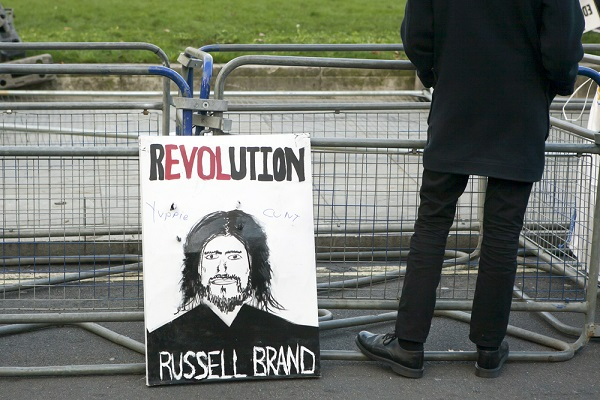Many of us were first introduced to Russell Brand as the off-color yet strangely lovable rock star Aldous Snow, in the 2008 comedy Forgetting Sarah Marshall. This catapulted him to widespread fame, since which he has reprised his role in the spin-off Get Him to the Greek, voiced roles in family comedies such as Hop and Despicable Me, and put his own spin on a classic Dudley Moore character in the remake of Arthur. Now that Russell Brand is sober, he also finds time to write, present podcasts and lend his voice to a cause he holds near and dear—addiction recovery.
While Brand speaks openly about his addiction, and even appears in the 2012 BBC documentary Russell Brand: From Addiction to Recovery [1], some of his fans may not know his story. We would like to shed a bit of light on his struggles with addiction, as well as his road to recovery. We also wish to discuss his extensive work as an activist, including his plans for the future.
As the heroin epidemic continues to surge, Russell Brand continues to act as a dedicated ally to those in recovery. Those who wish to aid the fight against drug addiction may benefit from his example.
Before Russell Brand got Sober: A Story of Addiction

Russell Brand, according to an interview he gave Oprah [2], became an addict before he used drugs. His addictive behaviors began with food, obsessively consuming chocolate. In his book Revolution, he also mentions struggling with bulimia, claiming that purging himself actually helped him to fill an internal void.
His other early addiction was pornography, an issue he developed during a period of isolation. Brand describes his childhood as a very lonely one, living with a mother who often struggled with her health. Unable to deal with his unfortunate circumstances, which included not only an ailing mother but also an instance of sexual abuse by one of his tutors, he attempted to change his feelings. Like most addicts, however, he thought that he could change his internal world through external means. As a result, he eventually turned to drugs. He told Oprah:
“I’ll use anything to stop myself feeling, and as a little kid I was very lonely and confused. Anything that could temporarily relieve that, I was very grateful for. When you take drugs out of the equation, those issues remain.”
A Common Story
In this regard, Russell Brand tells a story well-known to those who struggle with alcoholism and addiction. Many of us developed our issues with substance abuse as a means of escape from other issues. Just like Brand, we hide from our external circumstances by turning to other external things. We develop compulsions that only serve to cause us inner turmoil, which hurts us far more than anything on the outside. In Revolution, Brand suggests that young people forced to deal with difficult circumstances are all but destined to follow this path:
“If you can’t escape the system, you’ve got to escape from yourself. If you’re looking for God, for salvation, for a connection, for sanctuary from the cuckoo self incubating in you, and there’s no map, no guide, no story, no folk memory of how to get there, sooner or later you’ll pick up a bottle, a pipe, or a brick.”
How Did the Story Start?
Purging since the age of 11 and diagnosed with ADHD and bipolar personality disorder, Brand most certainly grew up without a map. Heroin didn’t help. He tried other substances, some of which—crack, for instance—he did not particularly like. Nonetheless, he carried on. This ostensibly nonsensical behavior, engaging in the use of substances one finds unfavorable, will strike a familiar tone with most individuals who suffer from drug addiction of a similar nature. At some point, happiness ceases to be the motivating factor. It becomes all about the escape.
After several public arrests, Russell Brand sought recovery in 2002. If not for this decision, he believes his life may have turned out much differently. As he told The Guardian:
“At best, I would have been living at my mum’s, a hopeless heroin addict. I couldn’t have taken that so I probably would have overdosed.”
Many addicts and alcoholics reach this point. Some luckily survive it. Others run out of luck. For Russell Brand, the realization of his life’s direction helped him reach the First Step in his recovery.
Russell Brand and Sobriety

Like all addicts and alcoholics who wish to recover, Russell Brand could not achieve sobriety without first acknowledging the problem. Many addicts say that they knew they were addicts long before they stopped using. In these cases, the struggle was not accepting their condition, but rather their need for help. Brand describes Step One in a similar manner. Early on in his book, Revolution, he writes:
“First I had to accept that there was a problem—that was blessedly evident with drink and drugs: I was miserable, becoming physically sick, getting hospitalized and arrested. The people that loved me were afraid that I was going to die. It was clear that something had to change, but I couldn’t see an alternative.”
Despite this initial hurdle, Brand believes many addicts face greater difficulties in Step One—especially those of the high-functioning variety. Today, Brand actually looks back on the consequences of his addiction with something akin to gratitude:
“I was fortunate in that my problem was obvious and pronounced but didn’t kill me. I know so many people that shuffle along with anxiety and pain like a stone in their shoe, but because they’re coping, holding down a job, not being forcibly institutionalized, they shuffle on, unaware that there is an alternative.”
Russell Brand Gets Sober
The consequences made it easier for Russell Brand to get sober. But no matter how you come by it, early sobriety sometimes requires great patience from those who seek it. Brand proved to be no exception. After entering recovery, he found himself facing the implications of sober living. Specifically, he took issue with the concept of lifelong abstinence. He writes:
“This was anathema to me: my life, identity, and ability to cope on the most fundamental level were all dependent on substance use. I could not countenance even the most trivial interaction without some kind of chemical wetsuit to protect me. When I was introduced to the concept of ‘getting to bed that night without using,’ I was afraid and suspicious. The fear had become a prison whose walls I would not breach.”
The Benefits of a Support System
Brand credits others in his support network for his eventual ability to overcome this fear. By following their example and listening to their stories, he learned to see the value in living one day at a time. He came to believe that he could find a solution to his drug problem. His description of this realization in Revolution resembles the experiences of many others in recovery:
“If people whose problems had been more severe than mine could stop, then perhaps I could. More importantly than that, the feelings they described were the same as the ones I was experiencing. This gave me something that my life had lacked until that point: community. Common unity.”
This unity did not come at the expense of his individuality. While he once feared that sobriety might take away his sense of identity, he continues to make a name for himself as one of the most unique personalities in the entertainment world. This contributes greatly to his success. The identity he continues to maintain in recovery factors greatly into his public appeal. But rather than simply using it for money and fame, he uses it to give back to the recovery community.
How Long Has Russell Brand Been Sober?
Now in his 21st year of sobriety, Brand reflects on his journey. Celebrating his 20th year sober in December 2022, Russell told The Independent “I wanted to express my gratitude for all the people who have helped me to remain clean and sober. "It's never done on your own and even though it's often seen and celebrated as a personal achievement - it is in essence, a community and spiritual achievement." I'm 20 years clean and sober today.”
Russell Brand the Activist

Russell Brand strongly believes in the decriminalization of addictive drugs. He feels that, if we accept addiction as a disease, then we should not punish those who suffer the symptoms. Writing for The Guardian, Brand notes that these symptoms know no bounds, affecting the wealthy and successful with the same ferocity as they affect anyone else. He specifically references the death of renowned actor Philip Seymour Hoffman:
“Whilst routinely described as tragic, Hoffman’s death is insufficiently sad to be left unsupplemented in the mandatory posthumous scramble for salacious garnish; we will now be subjected to mourn-ography posing as analysis. I can assure you that there is no as yet undiscovered riddle in his domestic life or sex life, the man was a drug addict and his death inevitable.”
Brand goes on to explain that Hoffman died alone, like many addicts. Just as Brand often did drugs that he found unenjoyable, many who overdose do not appear to use for the sake of true joy. They do not surround themselves with friends or happy circumstances. But this bleak circumstance, according to Brand, is not the only reason that Hoffman’s death was inevitable. He primarily blames our current drug laws and the stigma that drives them. He voices the need for more understanding legislation, and decries a nation that hesitates to put such laws into immediate action.
“The troubling message behind Philip Seymour Hoffman’s death, which we all feel without articulating, is that it was unnecessary and we know that something could be done. We also know what that something is and yet, for some traditional, prejudicial, stupid reason we don’t do it.”
A Personal Cause
If he sounds like he takes this personally, he does. Not only because of his own struggles with addiction, but because of those that he has lost. Russell Brand speaks often of his friendship with Amy Winehouse, who died of alcohol poisoning in 2011. Her death inspired him to make his BBC documentary, in which he makes it clear that America is not the only nation that he believes to suffer from outdated drug laws. But while he believes British society needs an overhaul in this respect, he also feels a level of personal guilt. He says on his YouTube channel:
“Even when Amy was alive, I had the sense of ‘that girl Amy Winehouse who I know and care about [has] got a really serious addiction issue. She’s definitely going to die. I must do something about it’—but obviously was unable to.”
We in recovery understand this feeling. It never gets easier to watch people we know fall off the face of the earth because they cannot stay sober. And on the rare occasion that it does get easier, we experience the strange sensation of feeling bad for not feeling bad enough. But instead of sitting around wishing that he felt worse, Russell Brand decides to channel his sadness into action. Motivated by the loss of one friend, he works to save others by spreading the message of recovery.
Spreading Hope
Brand does not stop at writing and making YouTube videos. In 2012, he took two particularly active roles in his support of the recovery community. His BBC documentary includes part of his testimony to a parliamentary committee, in which he discusses his views on drug laws. And that same year, his spiritual growth was recognized by none other than the Dalai Lama when Brand was asked to host a Buddhist youth event.
Russell Brand writes prolifically about addiction, speaks to lawmakers about the need to update drug laws, and has received recognition from one of the foremost spiritual leaders in the world. His achievements in the field of activism form a most respectable curriculum vitae. But he doesn’t rest on his laurels. He continues to do what he can, that his words and his deeds might help to save the lives of many who suffer from this disease.
The Fight Continues

Russell Brand does not intend to cease his activism any time soon. In fact, he views it as an absolutely necessary part of his sobriety today. He explains in Revolution:
“Even now, eleven years clean, I still feel the feelings that led me to drink and take drugs, but now I have access to an alternative way to change my feelings. The techniques are simple but not easy. I believe that by sharing these methods we can overcome together, not only addiction to substances but our addiction to a way of life that has been intoxicating us all.”
This is where Brand stood when he published Revolution in 2014. Three years later, his book, Twelve: Freedom from our Addictions, described the tools and methods he learned while overcoming his own struggles. Brand believes that others may use these tools to work through addictions of all sorts, from drugs and alcohol to caffeine and online shopping.
While the book includes a great deal of humor, Russell Brand himself suggests that parts of the tale is quite harrowing. In Twelve’s book description on Amazon, he writes:
“This manual for self-realization comes not from a mountain but from the mud… My qualification is not that I am better than you but I am worse.”
If Russell Brand Got Sober, You Can do it Too
While we may not all attain Hollywood, we all can attain sobriety. If you or a loved one are struggling with an addiction, Avenues Recovery is here to support you in your journey toward recovery. Leaders in addiction rehabilitation and with detox and treatment programs situated around the USA, we’ve got the expertise needed to guide you home. Contact us to hear how we can help you.
Sources
[1] www.youtube.com


